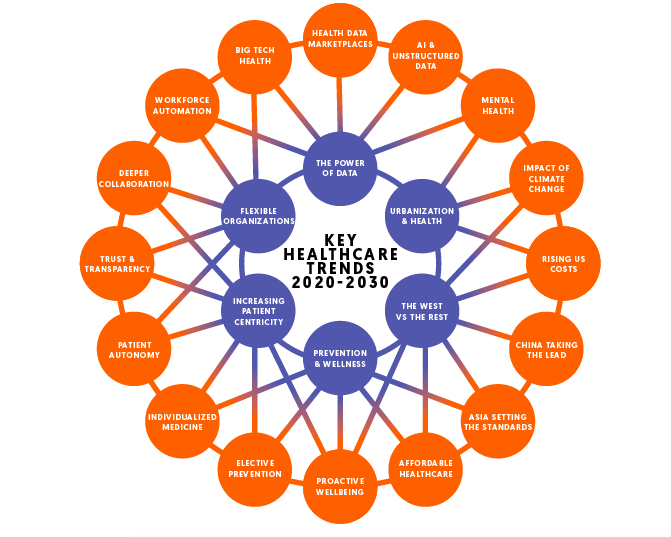Tim Jones and Jonathan Besser report on the technology and talent challenges facing healthcare leaders around the world
Propelled by innovation in technology, the healthcare sector is undergoing major changes. In the US, Amazon is embedding itself in the prescribed-drug supply chain, while in the UK, Alexa is answering patient questions on behalf of the National Health Service. Apple is consolidating health records covering a wide range of clinical and personal information, and increasing numbers of people are using the Apple Watch to track their vital signs, 24/7.
To assess the leadership implications of these technological changes and the ongoing talent challenges faced by the sector, Future Agenda and Duke Corporate Education led a series of expert discussions with regulators, researchers, doctors, care providers and leaders from businesses, charities and NGOs. Our research identified 16 future shifts that could drive substantial change across multiple systems (albeit that not all are universal) and six macro trends which are the most significant influences on the future of healthcare.

Macro trends shaping the future of healthcare
- The power of data Exponential growth in health data will provide multiple benefits for diagnosis, integration and personalization of care. As diverse healthcare players share more and better patient data, multiple efficiencies will be created.
- Urbanization and health More than half of today’s global population live in cities; the UN forecasts that the proportion will reach 68% by 2050. Urban life brings a range of social and environmental pressures affecting human health, including obesity, limited physical activity, and increased risks of contagion.
- The West vs the rest The eastward shift in economic influence and innovation prowess changes the balance of power in health. Asia increasingly sets both standards and prices, forcing a change in many Western models.
- Prevention and wellness More advanced, personalized diagnostics are aligning with growing societal and political pressure to drive a shift to proactive prevention, in preference to the expensive cure of disease.
- Increasing patient-centricity The step-change underway in individuals’ health data is enabling care to be transformed. It is becoming more personalized, and more effective.
- Flexible organizations New organizational forms – flatter, collaborative and virtual – are increasingly dominant. New technology and a mobile workforce enable this shift.
Assessing the challenges ahead
These trends create interlinking priorities for leaders. The ever-increasing impact of technology is connecting with changes in external markets and patient expectations. Leaders will need to consider the implications carefully to ensure that healthcare can deliver for individuals, customers and communities alike.
The leadership implications of continuing technological development
New technology continues to be transformative, but the greatest issues facing leaders are not technological, operational or financial: they are human-centred. The challenges arising from the intersection of data, technology and fast-developing trends are particularly acute. Key questions for leaders include:
- What are the data-driven disruptors facing us? How do understand, predict and capitalize upon current and future disruptors?
- How can we capitalize upon new data in a thoughtful and trustworthy manner which empowers customers and employees, and respects sensitivities around data transparency, storage and management?
- How can we use our expert organizational and individual knowledge to drive and lead innovation for the greater good?
- How can we capitalize on technological advances to create a workplace of the future, that attracts and retains the best and the brightest?
- How can data and technology be combined with empathy and an understanding of the issues presented by a changing context, such as urbanization and climate change?
- How can we use data and technological advances to support and drive the development of wellness and prevention? Are we well-positioned to enable this?
Talent and changing markets: leading in the new normal
People with the mindset, ability and resilience to thrive in the evolving global healthcare industry are at a premium. They need to be identified, developed, and encouraged to shape the future. This requires a rational, consistent process that clearly engages with each individual’s intelligence and their ability to learn and develop.
Two other elements are also important: the heart and the hands. Organizations need to appeal both to a person’s passions and intrinsic motivation and ensure they have the ability to take what they know and control and shape it. An environment that delivers these elements simultaneously, and succeeds in doing so across cultures, is indispensable for success. Start by asking:
- Do we as leaders understand how our employees and purchasers are changing currently and into the future? If we don’t understand them, how do we lead them and our organizations?
- How do we meet the need to work with increasing agility using technology?
- How do we learn to understand the needs, leaders and customers of emergent and emerging markets?
- What can we do to address the shifting focus of both buyers and organizations as they shift East?
- How do we attract and retain talent that understands Asian markets?
Forward-looking healthcare leaders need to shape a brighter future, ensuring their organizations are more agile, adaptive and able to accelerate. Leaders will need to demonstrate flexibility and mastery across a range of areas: from strategic orientation, to customer and patient centricity, operational excellence, and the skills and mindset needed to lead world-class performance. Above all, leaders must develop real clarity about the implications of these trends.
The future of healthcare will be shaped by leaders’ curiosity, compassion and courage, and their ability to develop connections with the people and communities they serve.
— Tim Jones is program director for Future Agenda. Jonathan Besser is a managing director for Duke CE.
— Download the full report at bit.ly/DukeCEFoH



